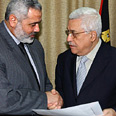
Gilad Shalit has become a factor in the internal Palestinian conflict, a Palestinian source told Ynet Monday.
According to the source, who is familiar with the negotiations between Hamas and Fatah, the matter of the kidnapped IDF soldier is no longer an separate issue between Hamas and Israel, with any progress made on it depending on the release of Palestinian prisoners.
"If actual progress in the talks isn’t made, and Hamas is not given more control over PA matters, in addition to the earlier demands made, there can be no real progress in Shalit's case," he noted.
The source further said that the negotiations for Shalit's release are not likely to resume prior to the Palestinian conflict being resolved.
Fatah and Hamas delegations are scheduled to meet in Cairo next week, in hopes of the talks resulting in a reconciliation between the factions, or at least produce some ease in the tensions between the parties.
Over the last few weeks, noted the source, both sides – along with Egypt – have been laying the necessary groundwork to ensure the dialogue's success.
Hamas, he continued, is finally willing to discuss relinquishing its hold on the Gaza Strip, but the price it may ask for – the PA forfeiting an early elections and allowing its government to end its tenure in two years as planned – may overshadow the talks.
Troublesome demands
"If we can formulate a solution which would please Hamas, there is a good chance the split between the Palestinian factions could come to its end," said the source.
Sources with in Hamas, however, noted that there are several preconditions to the talks. Dr. Osama al-Muzeini, who holds the Shalit portfolio within Hamas, said the group has four key points that are nonnegotiable:
- Hamas will not agree for the national Palestinian issues to be separated when discussing a permanent agreement with Israel.
- Hamas demands that while the security forces in Gaza implement a reform, the West Bank's security forces would undergo a similar one. This may prove to be a problem, since by allowing that, Hamas would essentially assert some control of the West Bank's security forces.
- Hamas will not agree to ending the current Gaza government's tenure earlier then expected.
- Hamas demands the Strip be considered as part of the Palestinian Authority in any future agreement with Israel.
Despite the cautious optimism expressed regarding the talks' prospects, al-Muzeini's statement indicates that the dialogue between Hamas as Fatah stands to be anything but simple; especially when considering that the former is likely to demand its delegates be made part of the PA's establishments – a demand Palestinian President Mahmoud Abbas may have trouble accommodating.
The two sides are also split on the question of extending Abbas' presidential tenure, which is scheduled to end on January.
Abbas may face unexpected competition, as a West Bank professor, Dr. Abed al-Satar Qassam, has recently announced his bid for the Palestinian presidency.
Qassam, who is known as one of Abbas' fierce opponents, said recently that if the Palestinians manage to hold a presidential election as planned, "the public's disappointment with the Palestinian factions give me reason to foresee a good outcome for the elections."















